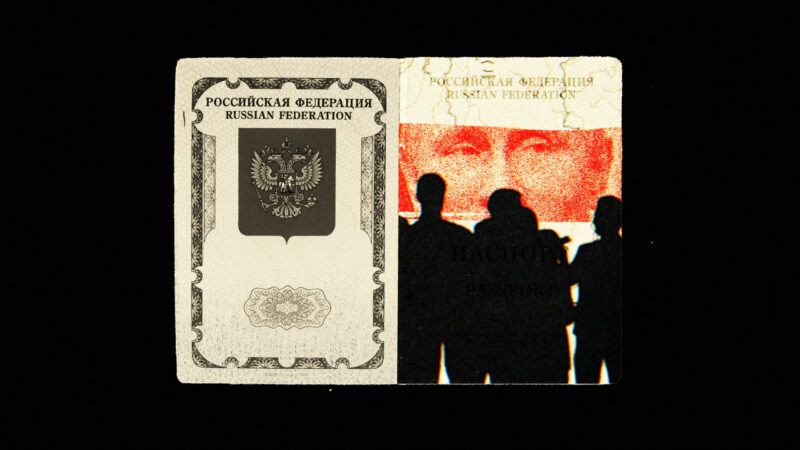It's a Mistake To Turn Away Russian Civilians Fleeing Conscription
Several countries are rejecting Russians fleeing forced military service. But offering them refuge would help protect dissidents and deprive Putin of critical manpower.

In a national address last week, Russian President Vladimir Putin outlined new wartime measures to bring 300,000 civilians into military service as the Russian invasion of Ukraine drags on. Though authorities expressed that only Russians with military service and fewer than three children would be brought up to fight, this doesn't seem to be true in practice. Thousands of Russians reportedly have already received draft papers and journeyed to training locations.
Others, unwilling to fight the Kremlin's war and fearing the possibility of a broader national draft, have decided to flee. Few nations still operate flights with Russia, but routes to those destinations quickly sold out following Putin's announcement. Google searches for "how to leave Russia" surged.
Rather than opening the door to the civilians fleeing forced military service, many of Russia's neighboring countries are turning them away. Estonian Foreign Minister Urmas Reinsalu said that being drafted into the army "does not constitute sufficient grounds for being granted asylum in another country."* Latvian Foreign Minister Edgars Rinkevics cited "security reasons" when he announced that Latvia wouldn't "issue humanitarian or other types of visas to those Russian citizens who avoid mobilization." Poland and the Baltic states all say they won't offer asylum to unwilling Russian conscripts.
But this approach is misguided for a host of reasons, and any nation opposed to Putin's brutality would do well to take in the Russians fleeing it.
For one, as Volokh Conspiracy blogger and George Mason University professor Ilya Somin points out, Putin's "mobilization policy was obviously brought on by Russian manpower shortages and accumulating setbacks on the battlefield." Civilians who otherwise might have had escape options could instead be forced to replenish the forces fighting in Ukraine. Every Russian denied asylum represents an additional pair of boots that Putin could deploy to the frontlines.
There's also the problem of ascribing collective responsibility. Many foreign leaders who support closing borders to Russian civilians castigate them for not doing more to stop the sins of their government. But thousands of Russians have turned out to protest the brutal invasion of Ukraine, only to be met with Putin's brutality themselves. Demonstrators detained after protesting the new mobilization order could face up to 15 years in jail. There clearly isn't unanimous domestic support for the war, and trapping protesters within Russia's borders alongside the actual perpetrators of the conflict is unjust (not to mention a policy that runs the risk of alienating civilians from the West).
Several men who fled Russia told NPR that people who protest the war and mobilization end up arrested, beaten, and then drafted. Dissidents have reportedly turned to harming others—a Russian conscript shot a military officer today in apparent protest of the mobilization order—and even themselves as they try to avoid military service. Google searches for "how to break an arm at home" surged in Russia after Putin gave his mobilization address. Lacking an escape route, this is the desperation some Russian conscripts now feel.
In contrast to much of the European Union, Germany is charting a prudent path when it comes to Russians fleeing forced military service. German Justice Minister Marco Buschmann tweeted, "Many Russians are leaving their homeland—anyone who hates Putin's path and loves liberal democracy is welcome in Germany." German Interior Minister Nancy Faeser similarly noted that "deserters threatened with serious repression can, as a rule, obtain international protection in Germany."
That's a crucial guarantee for many Russians, as Putin just last week signed laws that will punish anyone who deserts, surrenders, or resists service with up to a 10-year sentence. "Russians trying to flee Putin's war need the opportunity to exit, especially since it's dangerous to use their voices in their home country," writes Reason's Eric Boehm. "Let Russians vote with their feet."
Putin's war is a brutal and unjustified one. But that shouldn't lead nations to punish Russian civilians. Rather, offering refuge to those fleeing forced military service would both help protect dissidents and deprive Putin of critical manpower as his invasion falters. "If you are against the war," as one civilian told NPR after fleeing Russia, "the best thing to do is try to get out from there."
*CORRECTION: The quote and attribution have been corrected.

Show Comments (51)